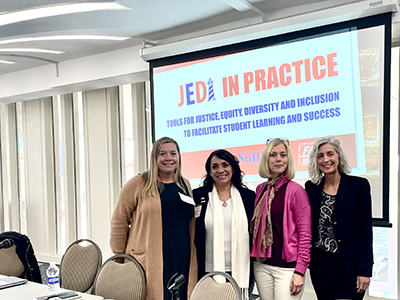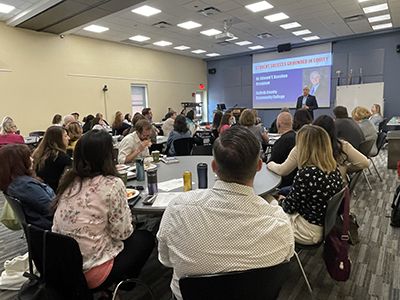Cynthia Eaton
Being interviewed by the American Federation of Teachers for AFT News, Rachael Millings (Math, Eastern), was quite forthcoming: “I had never taken the time to look at the racial or gender similarities or disparities in my final grade rosters,” she acknowledged. Time is often the issue. Rachael has long been deeply involved at the college, serving in leadership roles in campus and college-wide governance and other committees. She is thorough, detail oriented and reliable. Time is a challenge for many of our busy faculty members, especially as our full-time numbers continue to decline. The good news, Rachael explained, is that being part of the JEDI Institute provided the opportunity to pause and reflect. “JEDI gave me some time in the summer to take a step back and ask, ‘Is the experience that a student has in your classroom equitable?’” Rachael is among the 111 faculty and staff who have participated in our JEDI Institute to date, 66% of whom are FA members, taking the time to engage in smart self-examination with the express purpose of helping all students succeed. Examining outcomes Noticing some disparities in student outcomes based on race and gender, Rachael is investigating her classroom practices more closely this academic year as part of her JEDI project. We know a variety of factors influence students’ academic performance, but JEDI provides strategies for faculty to try to work toward more equitable outcomes. If we expect students to do all they can do to succeed, we should be doing all we can to help them succeed as well. That’s the idea of becoming equityminded in our approach rather than deficitminded. That’s what we mean when we say “meet students where they are.” But what it really boils down to is this: If there is a little something more we can do to help all students succeed, why wouldn’t we at least try? Statistics provided by OPIE show that the college is doing a decent job bringing students to the college but work needs to be done in helping improve retention rates—a goal that benefits every single one of us at the college, students and staff alike. A variety of such suggestions are mentioned by Ginny Myers in her AFT News article about our JEDI Institute, called “Faculty/staff mission: Become more JEDI.” Others were shared by several of our JEDI board members—Christina Vargas, Jill Santiago, Caitlin Compton-Almo and me—during our presentation at the first annual SUNY Diversity, Equity, Inclusion and Social Justice in the Curriculum Conference: Building a Community of Practice in Albany in early November. The goal is addition, not division While sometimes a faculty member will come into the JEDI program questioning whether focusing on different identities like race and gender is “divisive,” they leave with new perspectives.
Discussing differences in experiences is not inherently divisive, explains Christina Vargas, College Diversity Officer and Title IX Coordinator. Raising awareness about how students experience the college, what communities they come from and their cultural backgrounds helps us to best meet their needs and foster their success. “Presenting disaggregated data on outcomes helps facilitate the conversation about why there are differences,” Christina explains. “If we want to foster an improved sense of belonging, we can make connections with others while understanding differences, and we can continually work to challenge our own assumptions and unconscious beliefs.” JEDI gives you the space to pause and reflect on these things. What has been helping the JEDI Institute continue to grow is that participants leave with a few core understandings, which are echoed in the AFT article “Faculty/staff mission: Become more JEDI”:
Join us and see for yourself Every year we survey JEDI participants and use their feedback to revise and improve our program—and you know that SCCC faculty and staff do not hold back on their opinions. We find their honesty refreshing and very helpful because it is conveyed respectfully and with a goal of improving things at the college. If you haven’t yet participated, contact me to attend our January 5 workshop on Zoom to see what some of your colleagues are doing by way of individual projects. Or contact Christina Vargas if you’re interested in learning more about the JEDI Institute for summer 2024. Take some time to pause and reflect on what really is and is not happening in your classrooms and in your workspaces. You might be surprised by what you notice. |

